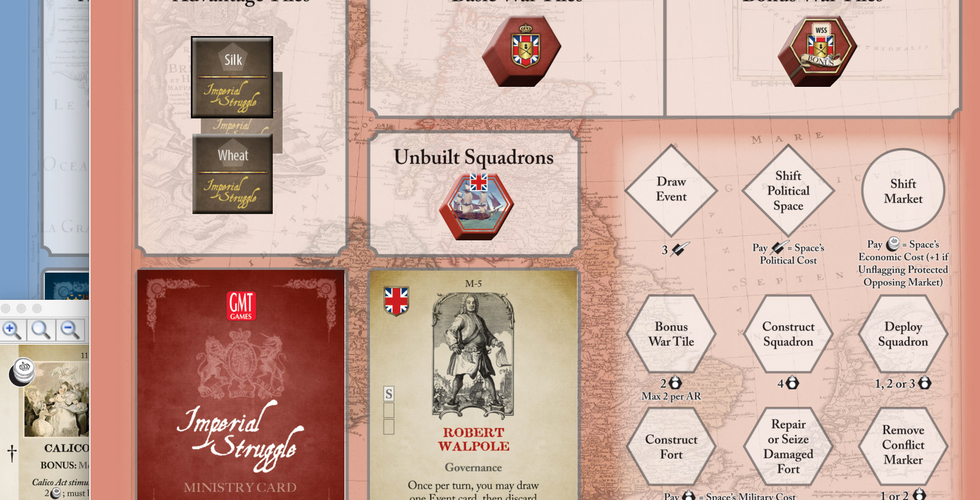The Imperial Struggle is Real
- Bert

- Jan 22, 2021
- 4 min read
I have seriously struggled with this one. I have played a lot of war games and frankly a lot of them in recent times. But this one struck a cord with me. Imperial Struggle is a follow up game to the Cold War simulation Twilight Struggle. Twilight struggle came out in 2005 and was an instant classic 15 years latter its still #9 on boardgamegeek.com . Imperial Struggle ratchets up the complexity and imperialism (maybe to the detriment of the game) as it sits just above Blokus at 996 on BBG.

The game itself has good mechanics and played well. It took us a bit to ramp up on the rules because there was a lot of different mechanisms happening all at once and we played over a few nights. I will get back to that in a bit. The issues I have with the game are probably a result of making a game themed in "The Age of Reason". The late 1600s and 1700s were a very dark time for the world both France and England ruled over a lot of the worlds population and more importantly a lot of its trade. This was the time that the East India Trading Company came in to power (under the British flag). During this time was the height of the chattel slave trade in the Atlantic. This time period setup the trade routes throughout the British and French Empires. They were 1st and 3rd respectively in the slave trade overall.
"... I am sure that you did not come here for a history lesson but I believe its a very important that we reflect..."
Imperial Struggle ends in 1789 just after The American war of Independence, and a few decades before the end of the slave trade(not slavery) in the British Empire. Now I am sure that you did not come here for a history lesson but I believe its a very important that we reflect on what is being simulated by a game. I have been finding myself asking if games are a good way to teach the topics of imperialism and slavery. The conclusion I have come to is games can be a way to teach people but Imperial Struggle is not the way to do that. The rule book for this game does not mention the word slavery once. There is even a space on the board where you can take advantage of slave contracts to build your navy. I believe that you should know what your simulating during a game.

The game play of Imperial Struggle is good and the complex nature of the rules doesn't distract from playing the game. I played as France against Rick and over the course of three nights I ran the French Empire into the ground and did not even make it to the American War of Independence before I lost. Sorry America. The First 4 turns saw the French keep pace with the English. But the draws for trade and an early decision on my part to give up most of India to focus on the other 3 parts of the board turned out to cost me dearly. I never really took the lead for long and then it all collapsed for me during the seven years war.
"..you go about typical Imperial tasks like taking over markets, building forts moving your navy and meddling in other countries affairs with diplomatic actions."
The game consists of "Peace" turns peppered with "War" turns. During the Peace turns you go about typical Imperial tasks like taking over markets, building forts moving your navy and meddling in other countries affairs with diplomatic actions. Those actions are reinforced by Cards from your ministry deck, and event cards. Sometimes when you take over the diplomatic spots you get an advantage that you can use once per peace turn. I lost a lot of those and that also was part of my downfall.

The "War" turns happen off of the main map board. There is a series of side boards, one for each of the four wars that tokens are placed on. There is one token from each side placed on the new war board as the old one is removed. As you play through the "peace" turn you can add and swap out tokens in each of the sub wars on the war board. War is easy to resolve you just add up the token's bonuses and the bonuses from the map board(the type and location is listed on the board under "Bonus Strength") Who ever has the highest total wins the listed VP/bonuses listed under the war.
I would like to close with this is not a game for everyone. The rules are deep and sometimes not as detailed as they could be with some of the exceptions or fringe cases. I did think the mechanics were good and polished and it made for quick game play, we played over 3 nights on vassal in all I think it took us about 6 hours. I am not going to add it to my collection as it stands that is mostly based on the context and premise.
Designed by: Ananda Gupta, Jason Matthews
Players: 2
Published by: GMT Games
Year Published: 0
Recommended Ages: 12+
Time to Play: 240 minutes














































Comments